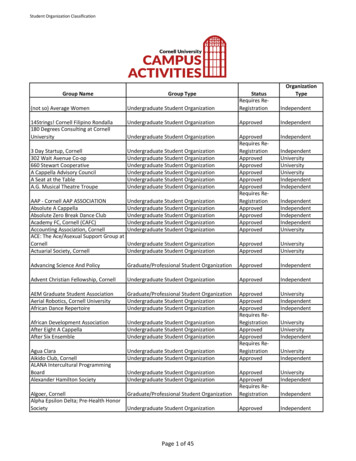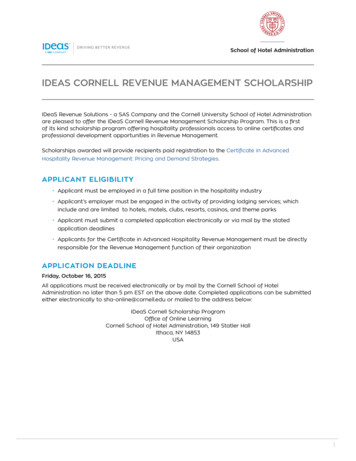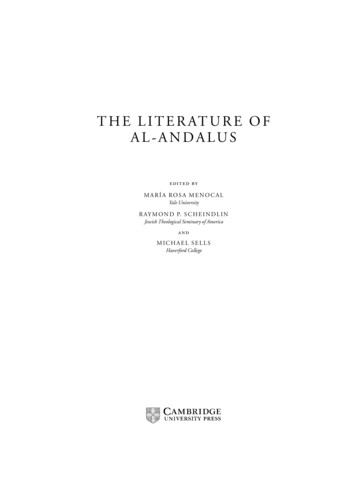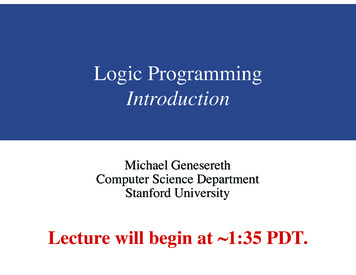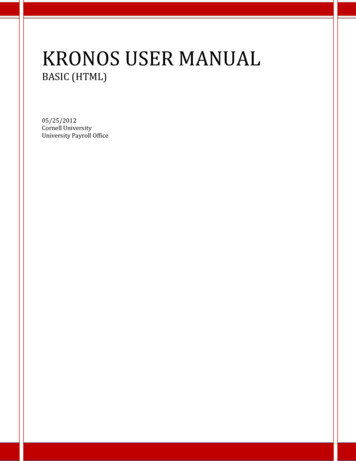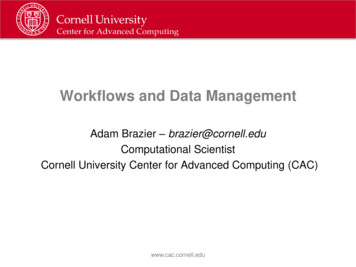
Transcription
thegamedesigninitiativeat cornell universityC :Classes
Classes in C Declaration Like a Java interface Fields, method prototypes Put in the header fileclass AClass {private: // All privates in groupint field;void helper();public: // All publics in groupAClass(int field); // constructor AClass();// destructor}; // SEMICOLON!Implementation Body of all of the methods Preface method w/ class Put in the cpp filevoid AClass::helper() {field field 1;}AClass::AClass(int field) {this- field field;}AClass:: AClass() {// Topic of later lecture}
Classes in C Declaration Like a Java interface Fields, method prototypes Put in the header fileclass AClass {private: // All privates in groupint field;void helper();public: // All publics in groupAClass(int field); // constructor AClass();// destructor}; // SEMICOLON!Implementation Body ofClassall ofnamethe methodsactslike aw/ class Prefacemethod Put innamespacethe cpp filevoid AClass::helper() {field field 1;}AClass::AClass(int field) {this- field field;}AClass:: AClass() {// Topic of later lecture}
Stack-Based vs. Heap BasedStack-Based Object assigned to local var Variable is NOT a pointer Deleted when variable deleted Methods/fields with period (.) Example:void foo() {Point p(1,2,3); // constructor // Deleted automatically}Heap-Based Object assigned to pointer Object variable is a pointer Must be manually deleted Methods/fields with arrow (- ) Example:void foo() {Point* p new Point(1,2,3); delete p;}
Stack-Based vs. Heap BasedStack-Based Object assigned to local var Variable is NOT a pointer Deleted when variable deleted Methods/fields with period (.) Example:Heap-Based Object assigned to pointer Object variable is a pointer Must be manually deleted Methods/fields with arrow (- )Also ifpointer to Example:stack-basedvoid foo() {void foo() {Point p(1,2,3); // constructor // Deleted automatically}Point* p new Point(1,2,3); delete p;}
Returning a Stack-Based Object Do not need heap to return Can move to calling stack But this must copy object Need a special constructor Called copy constructor Takes reference to object C calls automatically Is this a good thing? Performance cost to copy Cheaper than heap if smallPoint foo point(float x) {Point p(x, x);return p; // Not an error}CallsPoint::Point(const Point& p) {x p.x;y p.y;z p.z;}
Returning a Stack-Based Object Do not need heap to return Can move to calling stack But this must copy objectPoint foo point(float x) {Point p(x, x);return p; // Not an error} Need a special constructorCallsg Called copy constructornirtsanreturuoynehwsne Takes referencetoobjectppahtWhaPoint::Point(const Point& p) { C calls automaticallyx p.x;y p.y;z p.z; Is this a good thing? Performance cost to copy Cheaper than heap if small}
Copy vs Move ConstructorCopy Constructor Point(const Point& p) Copies the object p Object p can still be usedMove Constructor Point(Point&& p) Takes resources from p Object p not safe to use Does not require C 11 Requires C 11 Same as move if Better than copy if Only has primitive fields Has no allocated resources Example: cugl::Vec2 Object is a return value Object has fields in heap Example: cugl::Poly2
The Many Meanings of const In C , it is common to see something like:const Point& foo(const Point& p) const;Believe it or not, these are not the only consts!But these are generally the only ones to useSee online tutorials for more
The Many Meanings of const In C , it is common to see something like:const Point& foo(const Point& p) const;Caller cannotmodify theobject returnedBelieve it or not, these are not the only consts!But these are generally the only ones to useSee online tutorials for more
The Many Meanings of const In C , it is common to see something like:const Point& foo(const Point& p) const;Caller cannotmodify theobject returnedMethod cannotmodify theobject passedBelieve it or not, these are not the only consts!But these are generally the only ones to useSee online tutorials for more
The Many Meanings of const In C , it is common to see something like:const Point& foo(const Point& p) const;Caller cannotmodify theobject returnedMethod cannotmodify theobject passedMethod cannotmodify anyobject fieldsBelieve it or not, these are not the only consts!But these are generally the only ones to useSee online tutorials for more
The Many Meanings of const In C , it is common to see something like:const Point& foo(const Point& p) const;Caller cannotmodify theobject returnedMethod cannotmodify theobject passedMethod cannotmodify anyobject fields Believe it or not, these are not the only consts! But these are generally the only ones to use See online tutorials for more
Inlining Method Definitions Can implement in .h file Define methods Java-style Will inline the methods Less important these daysclass Point {private:float x;float y;public:Point(float x, float y, float z); Good compilers inline Function overhead is lowfloat getX() const { return x; }void setX(float x) {this- x x;} Only two good applications Getters and setters Overloaded operators Use this sparingly };
Operator Overloading Change operator meaning Great for math objects: , * But can do any symbol: - Point& operator* (float rhs) {x * rhs; y * rhs; z * rhs;return *this;} Method w/ “operator” prefix Object is always on the left Other primitive or const & Right op w/ friend function Function, not a method Object explicit 2nd argument Has full access to privatesPoint operator*(const float &rhs) const {return (Point(*this)* rhs);}friend Point operator* (float lhs,const Point& p) {return p*lhs;}
Subclasses Subclassing similar to Java Inherits methods, fields Protected limits to subclass Minor important issues Header must import parent super() syntax very different See tutorials for more detailsclass A {public:float x;A(float x) { this- x x; } };class B : public A {public:float y;B(float x, float y) : A(x) {this- y y;} Weird C things to avoid No multiple inheritance! No private subclasses};
Subclasses Subclassing similar to Java Inherits methods, fields Protected limits to subclass Minor important issues Header must import parent super() syntax very different See tutorials for more detailsclass A {public:float x;};class B : public A {public:float y; Weird C things to avoid No multiple inheritance! No private subclassesWeird thingsyou makeA(float x) {ifthis- x x; } it private};B(float x, float y) : A(x) {this- y y;}Like Java call to super
C and Polymorphism Polymorphism was a major topic in CS 2110 Variable is reference to interface or base class Object itself is instance of a specific subclass Calls to methods are those implementated in subclass Example: List int list new LinkedList int (); list.add(10); // Uses LinkedList implementation This is a major reason for using Java in CS 2110 C does not quite work this way
C and Polymorphism Cannot change stack object Variable assignment copies Will lose all info in subclass Only relevant for pointers C uses static pointer type Goes to method for type Why did they do this? No methods in object data Reduces memory lookup But was it worth it?class A {public:int foo() {return 42;}};class B : public A {public:int foo() {return 9000; }};B* bee new B();x bee- foo(); // x is 9000A* aay (A*)bee;y aay- foo(); // y is 42!!!
Fixing C Polymorphism Purpose of virtual keyword Add to method in base class Says “will be overridden” Use optional in subclass Needed if have subsubclass Or if not further overridden Hard core C users hate Causes a performance hit Both look-up and storage But not a big deal for youclass A {public:virtual int foo() {return 42;}};class B : public A {public:int foo() override {return 9000; }};B* bee new B();x b- foo(); // x is 9000A* aay (A*)bee;y a- foo(); // y is 9000
Templates: Like Generics But NotUsage Class has type parameter Add type at allocation time v new std::vector int (); Required in the C STL std::vector, std::deque std::unordered map Also in our asset manager Associate a loader with type amgr- attach Font (loader);Definition Preface class with template template class T class A{Txconst T& getX() { return x;}void setX(T v) { x v;}}; No .cpp file! Only .h Import header to use class Compiled at instantiation
Application: Smart Pointers Class that holds a pointer Tracks the pointer usage Can delete pointer for you Access pointer with get()pshared ptrptrid2 Type is templated typeid2 std::shared ptr Point std::shared ptr Font x1.0y2.0z3.0 This requires C 11 Which you should use Check your IDE settingsPoint
Smart Pointers and AllocationHeap Allocationvoid func() {Smart Pointervoid func() {Point* p new Point(1,2,3);shared ptr Point p; p make shared Point (1,2,3);delete p; }} Must remember to delete Deletion is not necessary Otherwise will memory leak Sort-of garbage collection
Smart Pointers and AllocationHeap Allocationvoid func() {Smart Pointervoid func() {Point* p new Point(1,2,3);shared ptr Point p; p make shared Point (1,2,3);resdelete p;utceLyroemMnisiht More on}} Must remember to delete Deletion is not necessary Otherwise will memory leak Sort-of garbage collection
Typecasting and Smart PointersNormal PointersSmart PointersB* b; // The super classA* a; // The subclassshared ptr B b; // Contains B*shared ptr A a; // Contains A*Acceptable:Bad:b new B();a (A*)b;Better:b new B();a dynamic cast A* (b);b make shared B ();a (shared ptr A )b;Good:b make shared B ();a dynamic pointer cast A (b);
Typecasting and Smart PointersNormal PointersSmart PointersB* b; // The super classA* a; // The subclassshared ptr B b; // Contains B*shared ptr A a; // Contains A*Acceptable:Bad:Better:Good:rsetnioPtrambon make shared B ();Sb new B();yssesmimsiha (shared ptr A )b;proa (A*)b;Polymb new B();a dynamic cast A* (b);b make shared B ();a dynamic pointer cast A (b);
Closures: C Lambda Functions Type: std::function T Type is function signature Allows function in variable Example Declaration:std::function void(int) a;Variable Capture Rulesint x 0;std::function int(int) a [ ](int y){ return x y; }; Important for callbacks Example: Collision listener See WorldController class This requires C 11 Which you should use Check your IDE settingsstd::function int(int) b [&](int y){ return x y; };x 5;int y a(4);int z b(4);
Closures: C Lambda Functions Type: std::function T Type is function signature Allows function in variable Example Declaration:std::function void(int) a;Variable Capture Rulesint x 0;std::function int(int) a [ ](int y){ return x y; }; Important for callbacks Example: Collision listener See WorldController class This requires C 11 Which you should use Check your IDE settingsfree variablestd::function int(int) b [&](int y){ return x y; };x 5;int y a(4);int z b(4);
Closures: C Lambda Functions Type: std::function T Type is function signature Allows function in variable Example Declaration:std::function void(int) a;Variable Capture Rulesint x 0;std::function int(int) a [ ](int y){ return x y; }; Important for callbacks Example: Collision listener See WorldController class This requires C 11 Which you should use Check your IDE settingscopies xfree variablestd::function int(int) b [&](int y){ return x y; };x 5;references xint y a(4); // Value is 4int z b(4); // Value is 9
Summary C has a lot of similarities to Java Java borrowed much of its syntax, but “cleaned it up” Memory in C is a lot trickier Anything allocated with new must be deleted C provides many alternatives to avoid use of new Classes in C have some important differences Can be copied between stacks if written correctly C supports operator overloading for math types C needs special keywords to support polymorphism
Stack-Based Object assigned to local var Variable is NOT a pointer Deleted when variable deleted Methods/fields with period (.) Example: void foo() {Point p(1,2,3); // constructor // Deleted automatically} Stack-Based vs. Heap Based Heap-Based Object assigned to pointer Object variable is a pointer Must be manually deleted Methods/fields with arrow (- )
